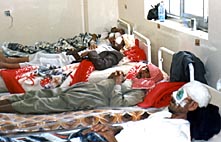
45 million people in the world are blind. 70-75% of Them are Blind With Treatable Diseases [Archives:1999/24/Health]
June 14 1999

Q: What is the purpose of your coming to Yemen?
A: We work to prevent blindness. Nearly 45 million people in the world are blind. 70-75% of them are blind and just need treatment to be healed. I mean that they are blind with a treatable disease, so we are working for the prevention of blindness. We are here to help the Yemeni people who are suffering from such diseases. We have been coming to Yemen since 1993 and we visited many parts of Yemen. This time, we have organized a camp in Abyan which we finished on Saturday 29th April, and our second camp will be held here in Sanaa. We think that this country needs our help, so we are here to help.
Q: Does your team consist of only doctors?
A: The team consists of 18 members: some doctors, some paramedical staff and some administrative staff.

A: We have examined nearly 4500 patients in Abyan, and we treated 319 cases with surgery mostly cataract operations and some glycoma operations, and we implanted lenses for 93 patients. We also distributed 1375 pairs glasses to the people of Abyan.
Q: Do you charge for performing these operations?
A: No, we are working free of charge. Every thing is free not only for the people of Yemen but we are working in nearly 30 countries in Africa and Asia. On this trip we are covering many countries. We started our program on April 10th in Somalia, and we organized two camps in Somalia, one in Djibouti, one in Tanzania, the fifth in Abyan and the sixth will be in Sanaa.
Q: How many people do you think you can treat in Sanaa?
A: We have done nearly 13 camps in Yemen, and in all the places which we have operated the range was around 300-400 patients. For example, in Hodeidah, we have operated on 500 patients we think that there are more than 3 million people in Sanaa, so we hope we will get a large number of patients.
Q: Do you follow-up the previous camp patients ?
A: Yes, we do two follow-ups. The first follow-up is within a week, which is very important, and after six weeks we send two doctors to do more follow-ups. Next year if we come back to do camps anywhere in the country, the patients will naturally come for recheck-up, for example in Abyan it was our first camp but before that we had a camp in Attaq, so many people came from Attaq for a recheck and some patients who had one eye operated on come to have the other one operated on. Before last year we operated in Saada and we hope that people from there will come for check-ups.
Q: On what criteria do you select the patients?

Q: You said glasses, do you mean the frames or the lenses?
A: We give glasses to those patients who are more than 40 years old and they usually need reading glasses. We give them complete glasses, the frame with the lenses, some patients complain that they have undergone an operation and were given glasses and they’ve lost the glasses and they cannot see again, so we provide this kind of glasses i.e. vision glasses. In terms of lenses we will implant the lens, these are simple contact lenses. We are implanting these during the surgery. It is a modern technique and we are planning here to implant more than 100 lenses.
Q: You said that you are not happy with the OPD could you tell me why aren’t you happy with the facilities here?
A: Before that I would like to say, that this hospital is cooperating very much with us and they are giving us every facility. We are expecting more than 4000-5000 Outdoor Patients and this is not possible to do in the OPD clinic where we are working, so we are looking for a place which is clean and far from the hospital. We need a place where we can control the flow of patients, and we don’t want to disturb the hospital activities. We are discussing these issues with the manager and the director of the hospital, and we hope that we can solve this problem. I also would like to say that the Ministry of Health and the government of Yemen are very cooperative, and this has encouraged us to organize more than one camp every year. I mentioned that we did two camps in Somalia, Djibouti, etc. This is the only country which is given two camps, because we are getting good cooperation here. They really cooperate very much with us, we bring all our equipment, and what we need here is beds, tables and chairs for these surgeries which could be easily provided by Yemen and also I would like to mention that in Yemen they usually provide us with residence and transportation too.
Q: How long do you think you will be staying in Sanaa?
A: Our program will last for one week in which we can perform 400-500 operations very easily. We have very competent and experienced surgeons who work from 07:30 to late night.
Q: Any last comment?
A: Once again I would like stress that the cooperation from this government, Ministry, hospital is very fine and the people of Yemen are very kind and the Yemeni hospitality is unique.
By: Hatem Bamehriz
Yemen Times
——
[archive-e:24-v:1999-y:1999-d:1999-06-14-p:./1999/iss24/health.htm]


